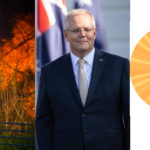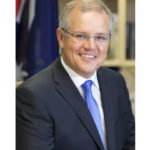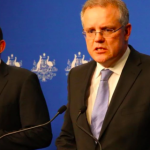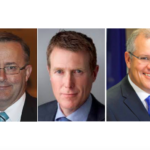Federal Coalition’s Persistent Culture Wars Could Be Its Undoing
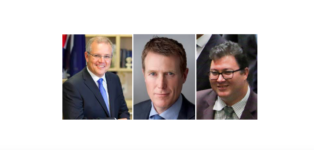
According to Institute of Public Affairs executive director John Roskam, Scott Morrison doesn’t go in for culture wars, as he’s too concerned with creating jobs. And, as the struggle to promote one ideology over all others fails to generate employment, the PM doesn’t engage in such politicking.
Writing in the AFR last week, Roskam points to a 3AW interview Morrison conducted in February, that involved host Neil Mitchell questioning the prime minister as to whether Australia might be “too woke” to the point that its “affecting democracy and debate”.
Morrison simply replied that what he cares about is his citizens’ “health and their jobs”.
Indeed, Roskam paints a portrait of a “practical” prime minister, who’s being dragged into the culture wars battlefield by “woke warriors”.
So, following this logic, the fallout the Coalition is experiencing after its attempt to sweep alleged sexual assaults under the carpet is now distracting the head of state from his real passion – job creation – so that, yet again, he has to reluctantly engage in public debate over societal values.
However, closer to the truth, Morrison’s time in office has actually been marked by constant ideological rhetoric and policy decisions that have fed into the Liberals’ long-term conservative ideological stance, in a manner that hasn’t been seen since the Howard era.
A conservative for all occasions
Generally, culture wars are seen as the conflict between traditional and conservative societal values pitted against those of progressives.
In Australia, these opposing sides came to prominence in the early 1970s, when radical white academics rewrote settler colonial history to include First Nations people and the atrocities they’d been subjected to, as they’d been written out of the accounts since Federation.
Although, it was the coming of the Howard government in 1996 that really saw the Liberal National coalition fortify its ideological bent as, over its decade in office, it targeted women, First Nations people, refugees and LGBTIQ communities, whilst it championed family values and patriotism.
The Howard era was marked by the demonisation of asylum seekers arriving by boat, legislating against same-sex marriage, a neo-colonial landgrab in the under the guise of the NT Intervention, the abolition of ATSIC and the Islamophobia that continues to pervade the war on terror.
In a 2006 address at the 50th anniversary of Quadrant magazine, Howard posited that “political correctness” was losing its grip, but the nation “should not underestimate the degree to which the soft-left still holds sway, even dominance, especially in Australia’s universities.”
“Until the bell rings”
Morrison gave his first official public address as PM on 6 September 2018. He did so in the NSW border town of Albury, which is the 1944 birthplace of the Liberal Party. And his speech invoked the spirit of party founder Robert Menzies, as it was held at a research centre named after him.
The PM said when Menzies came to town he had “a list of beliefs” making up Liberal Party values that had already been agreed to in Canberra. These consisted in the inherent value of the individual, their family and community, which led onto freedom of faith, religion, speech and association.
In hearkening back to the party’s past, Morrison declared he wanted an “even stronger Australia based on values”. He then went on to refer to stopping the boats and Dutton deporting noncitizens who threaten children, while he quoted Howard in saying, “we decide… who comes to the country”.
“I believe in a fair go for those who have a go in this country. I think that’s what fairness means in this country. It’s not about everybody getting the same thing,” the PM told the crowd. And he later added, “I don’t think that, for someone to get ahead in life, you’ve got to pull others down.”
Freedom to discriminate
Morrison’s prioritisation of religion in his first speech, along with concerns about foreigners, his lack of any recognition of First Nations people and the idea that those wanting better standing somehow suggests those in power will lose out have been hallmarks of his time in office.
The religious freedoms debate was one of Morrison’s key focuses prior to the pandemic. And while this prioritisation of religious protections under the Religious Discrimination Bill has been shelved, Liberal MP Kevin Andrews said in February, that a revised draft is in the waiting.
Proposed religious discrimination laws are the Christian Right’s response to the legalisation of marriage equality. The PM has been spearheading this backlash. And while its framed around protecting those of faith, it actually empowers the religious to discriminate against others.
The first draft was released in late 2019. An attack on LGBTIQ communities was expected, however the bill went much further in that it permits those of faith to discriminate against all minorities in the name of their religion, with a special clause allowing health professionals to refuse treatment.
Propagating ideology
The Morrison government obviously takes Howard’s warning about “lefties” effecting societal change in our nation’s universities seriously, as during the pandemic it took a wholesale swipe at these institutions.
As mass unemployment struck the country, the Coalition made three changes to the JobKeeper subsidy, so it didn’t extend to public universities. And while the government grappled with keeping employees in jobs in most sectors, it oversaw the mass sacking of higher education staff.
Then federal education minister Dan Tehan saw the passing of the Job-Ready Bill last October, which doubled the fees that apply to humanities and arts degrees, whilst it also led to an overall increase in the cost of education for all students attending university.
In terms of First Nations affairs, Morrison undermined Closing the Gap so it no longer entails concrete goals, he consistently devalues Welcome to Country by appending it with a greeting to ex-servicepeople, and last January, he likened the suffering of colonial invaders to those invaded.
The PM was also set on spending $6.7 million on marking the 250th anniversary of Captain Cook’s arrival on this continent, as he was planning on having a replica ship circumnavigate the country reimagining a voyage that the British navigator never took. Although, COVID put a stop to this.
Undermined by its own ideology
On International Women’s Day 2019, the PM said, in reference to gender equality, that it’s not a Liberal Party value to “push some people down to lift some people up”.
“We want to see women rise,” Morrison told the WA Women in Resources meeting. “But we don’t want to see women rise only on the basis of others doing worse.”
Right now, the Morrison government is in damage control specifically over matters relating to women. The major issue is his handling of two sexual assault allegations that he not only fumbled but continued to treat in a dismissive manner until the public backlash became too much.
While the head of government has since tried to retract on his earlier approach, and shuffled ministers around so that it might somehow appease the public’s offended sensibilities, the problems with his comments of two years ago underpin the issues now unfolding.
The government-supported national body dealing with gendered violence, Our Watch, clearly spells out that a primary driver leading to violence against women is gender inequality, along with structural inequality and discrimination.
The PM’s comments at the Women in Resources breakfast are a prime example of how under his leadership gender inequality is set to stay, because powerful men like him are too concerned about losing their seat at the table than admitting they have no special reason to be there.
And going by the polls since the recent sexual assault scandals broke, it would seem the Morrison government’s persistent waging of its culture wars in the name of its conservative ideology might very well be its demise.




